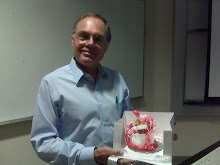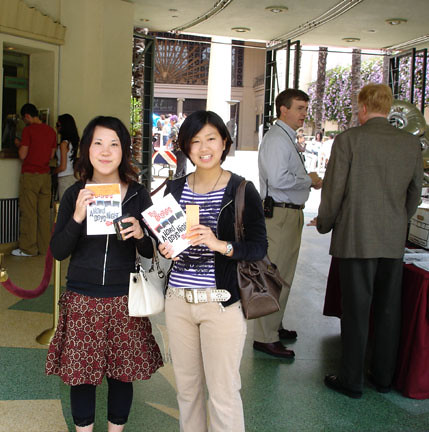Comical Pirates and a Gubernatorial Candidate
 Glendale College hosted a campaign appearance by California Treasurer Phil Angelides, who is running for governor. Some of those lenses were less than an arm's length from his face.
Glendale College hosted a campaign appearance by California Treasurer Phil Angelides, who is running for governor. Some of those lenses were less than an arm's length from his face.Until I read an article entitled "Menace to Comic Heroes?" in the Los Angeles Times the other day, I hadn't really considered the idea that comic books might begin to be digitally pirated. But apparently it's going on and an already beleagured little corner of the mass media is beginning to feel the financial effects.
***HOLLYWOOD BOWL TICKETS ALL SOLD: This morning, I sold the last of my Hollywood Bowl Tickets for this Friday evening. We will have a delegation of 85 strong (provided everyone shows up) to see Garrison Keillor's "A Prairie Home Companion" radio show. It should be a fine evening. If you are a student who still wants a ticket, check in class tomorrow and Friday to see if anyone wants to sell. Work schedules change, boyfriends get dumped, etc. There's often someone who wants to sell at the last minute.



 Glendale College's El Vaquero is one of many college-level student publications in California that would have greater protection from administrative censorship if a bill recently passed by the California Assembly becomes law.
Glendale College's El Vaquero is one of many college-level student publications in California that would have greater protection from administrative censorship if a bill recently passed by the California Assembly becomes law. After an assignment that took the MC101s all through the Getty Center, some of us got together on the lawn above the Getty Gardens. Some brought lunch. Others just savored the moment.
After an assignment that took the MC101s all through the Getty Center, some of us got together on the lawn above the Getty Gardens. Some brought lunch. Others just savored the moment. On Saturday, May 6 some 41 Mass Comm 101 students and guests went to Glendale's Alex Theatre for a matinee presented by the Alex Film Society. The festivities centered around a screening of the Beatles' film "A Hard Day's Night."
On Saturday, May 6 some 41 Mass Comm 101 students and guests went to Glendale's Alex Theatre for a matinee presented by the Alex Film Society. The festivities centered around a screening of the Beatles' film "A Hard Day's Night." As I wrote this medianote, I was overcome with a deep yearning for instant noodles. I think the Shrimp with Lime flavor is particularly good. You ought to try it.
As I wrote this medianote, I was overcome with a deep yearning for instant noodles. I think the Shrimp with Lime flavor is particularly good. You ought to try it.